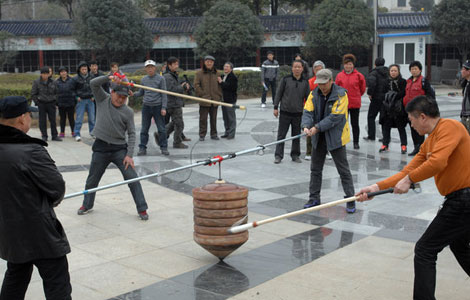 |
|
|
|
|||||||||
BEIJING - Xinjiang officials participating in China's annual parliamentary session have stressed their determination to fight terrorism and boost economic development.
Nur Bekri, Chairman of Xinjiang Uygur Autonomous Region, told Wednesday's session of the National People's Congress (NPC) that violent activities by individual terrorists will not affect the all-weather friendship between China and Pakistan, as the situation in the region remains stable and controllable.
Bekri said Xinjiang and neighboring countries have shared interests and objectives in fighting terrorism.
"Anti-terrorism is a global task, as terrorism is threatening the lives of all people in the world," said Bekri, also a deputy to the NPC, China's top legislature.
He said that in addition to domestic prevention and crackdowns, international cooperation is needed in the fight against terrorism.
Xinjiang, which borders Pakistan and Afghanistan, is home to China's Muslim Uygur ethnic people.
A group of religious extremists led by militants trained in terrorist camps in Pakistan set fire to a restaurant and randomly killed civilians in Xinjiang's Kashgar prefecture in July last year, leaving six civilians dead and 15 others injured.
An investigation found that the group's leaders had learned how to make explosives and firearms in camps of the terrorist group "East Turkistan Islamic Movement" in Pakistan before entering Xinjiang to organize terrorist activities.
In the most recent development, rioters killed at least 10 people and injured a number of others in Yecheng county of Kashgar on February 28.
Witnesses said people armed with cleavers attacked innocent pedestrians on the street of Yecheng. Police shot dead two of the attackers.
The Xinjiang government will not tolerate any terrorists, as their violent activities are inhumane and civilian-targeted, said Zhang Chunxian, secretary of the Xinjiang Committee of the Communist Party of China (CPC).
Zhang said the Yecheng incident, as well as other terrorist attacks that rocked Xinjiang last year, were related to the "three evil forces" of separatism, extremism and terrorism.
"This is not a religious problem, nor is it an ethnic problem. Their deeds are against the human race," Zhang said at the panel discussion of the Xinjiang delegation.8 "We shall show no mercy to these terrorists and fight them unswervingly. We shall not let them wave knives against our women, children and our innocent people," Zhang said.
Security experts say growing religious extremism in the region has fanned most of the violent attacks.
During Xinjiang's most deadly unrest in decades, 197 people were killed and about 1,700 others injured after riots broke out in the capital city of Urumqi on July 5, 2009.
Since then, Xinjiang has stepped up efforts to counter the region's terrorist forces. Zhang said the situation in Xinjiang was stable despite sporadic unrest.
Bekri said stability is the precondition for Xinjiang's development. "Stability is an overwhelming task, as there won't be development without stability."
Though the fight against terrorism is excruciating, the Xinjiang government has managed to strike a balance between anti-terrorism and its commitment to economic development to better people's lives.
Over the years, Xinjiang has witnessed rapid economic growth and an improvement in people's well-being.
In 2011, Xinjiang's gross domestic product (GDP) rose 12 percent year-on-year, a record high over the past decade.
And the region has set a GDP growth target of 11 percent this year, much higher than the 7.5 percent national target released by Premier Wen Jiabao in his government work report issued Monday.
By 2015, Xinjiang's per capita GDP is scheduled to reach the national average level. In order to fulfill this goal, Xinjiang's GDP over the next five years must be 3.5 percentage points higher than the national average, according to Bekri.
Wu Ying, iPad, Jeremy Lin, Valentine's Day, Real Name, Whitney Houston, Syria,Iranian issue, Sanyan tourism, Giving birth in Hong Kong, Cadmium spill, housing policy

|

|

|

|

|

|